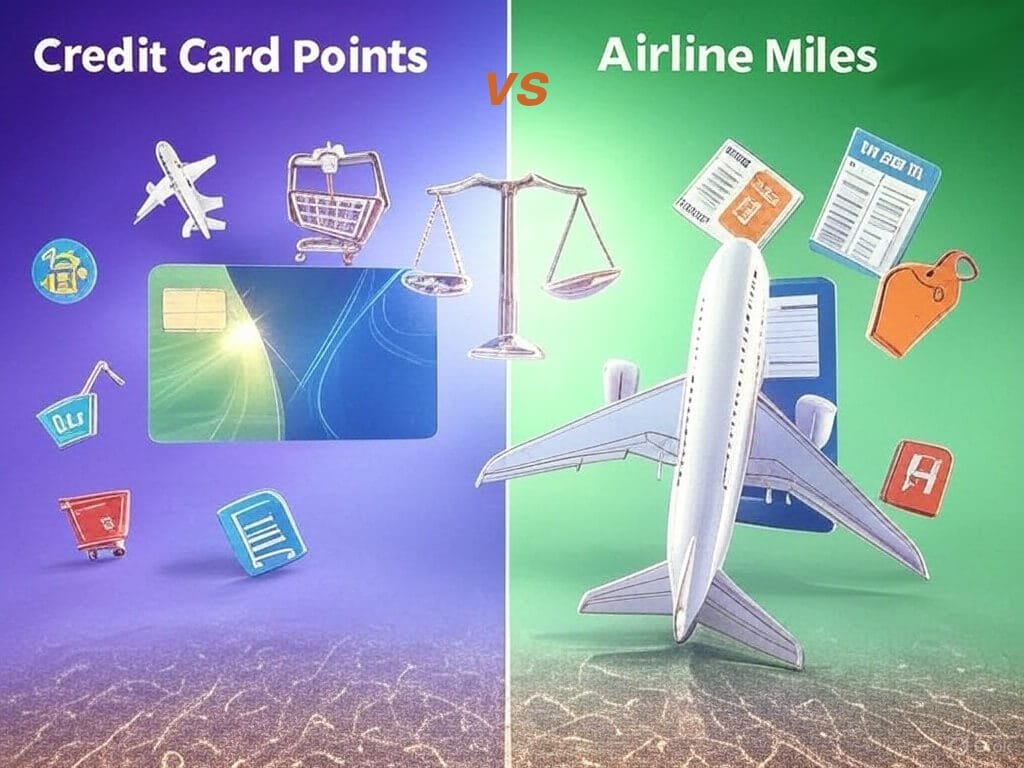Credit Card Points vs. Airline Miles: Which Offers Better Value?
In today’s world of financial flexibility and travel opportunities, rewards programs have become a cornerstone of consumer spending. Two of the most popular reward systems are credit card points and airline miles. While both offer enticing benefits, they cater to different lifestyles, spending habits, and travel preferences. This guide dives deep into the nuances of each system, helping you decide which one aligns best with your goals.
Understanding Credit Card Points
Credit card points are a versatile form of rewards earned through everyday spending. These points can be redeemed for a wide range of benefits, including travel, merchandise, gift cards, and even cashback. The flexibility of credit card points makes them a popular choice for consumers who want to maximize their rewards across various spending categories.
How Credit Card Points Work
- Earning Points:
- Points are earned based on your spending. Most credit cards offer 1 point per dollar spent, but some cards provide bonus points in specific categories like dining, groceries, or travel.
- For example, a card might offer 3x points on dining and 2x points on groceries, encouraging cardholders to spend in these categories.
- Sign-Up Bonuses:
- Many credit cards offer sign-up bonuses for new customers. These bonuses typically require you to spend a certain amount (e.g., $3,000 in the first 3 months) to earn a large lump sum of points (e.g., 50,000 points).
- These bonuses can significantly boost your rewards balance early on.
- Redemption Options:
- Travel: Points can often be redeemed for flights, hotel stays, or car rentals through the credit card’s travel portal.
- Merchandise: Some programs allow you to shop for electronics, home goods, or other items using points.
- Cashback: Points can sometimes be converted into statement credits or direct deposits.
- Gift Cards: Many programs offer gift cards for popular retailers.
- Transfer Partners:
- Some credit card programs allow you to transfer points to airline or hotel loyalty programs, potentially increasing their value. For example, Chase Ultimate Rewards points can be transferred to airlines like United or hotels like Hyatt.
Decoding Airline Miles
Airline miles are a loyalty currency primarily earned through flying and partnerships with hotels, car rental services, and retail outlets. These miles are designed to reward frequent travelers and can be redeemed for flights, upgrades, and other travel-related perks.
How Airline Miles Work
- Earning Miles:
- Miles are earned primarily through flights, but many airlines have partnerships that allow you to earn miles through hotel stays, car rentals, and even everyday purchases with co-branded credit cards.
- The number of miles earned depends on the fare class and loyalty tier. For example, a first-class ticket might earn 2x miles compared to an economy ticket.
- Loyalty Programs:
- Airlines offer tiered loyalty programs (e.g., Silver, Gold, Platinum) that provide additional benefits like bonus miles, priority boarding, and free checked bags.
- Higher tiers often require significant spending or frequent flying to achieve.
- Redemption Options:
- Award Flights: The most common use of airline miles is to book flights. The number of miles required varies based on the destination, season, and demand.
- Upgrades: Miles can be used to upgrade from economy to business or first class.
- Travel Perks: Some programs allow you to redeem miles for airport lounge access, hotel stays, or car rentals.
- Partnerships:
- Many airlines are part of alliances (e.g., Star Alliance, SkyTeam) that allow you to earn and redeem miles across multiple airlines.
Comparing Value: Credit Card Points vs. Airline Miles
When deciding between credit card points and airline miles, it’s important to evaluate their redemption value, flexibility, and alignment with your lifestyle.
Redemption Value
- Credit Card Points:
- Typically valued at 1 to 2 cents per point, depending on the redemption method.
- Travel redemptions often offer the highest value, especially when transferring points to airline or hotel partners.
- Airline Miles:
- Generally valued at 1.2 to 1.8 cents per mile when redeemed for flights.
- However, value can fluctuate based on blackout dates, demand, and seasonality.
Flexibility
- Credit Card Points:
- Offer greater flexibility with multiple redemption options, including travel, merchandise, cashback, and gift cards.
- Ideal for consumers who want to use rewards for a variety of purposes.
- Airline Miles:
- Best suited for frequent travelers who can maximize the value of miles through flights and upgrades.
- Less flexible for non-travel redemptions.
Lifestyle Alignment
- Frequent Travelers:
- Airline miles are often more valuable for those who fly regularly and can achieve elite status.
- Benefits like priority boarding, free checked bags, and lounge access enhance the travel experience.
- Casual Travelers:
- Credit card points are a better fit for those who travel occasionally or prefer flexibility in their rewards.
- The ability to redeem points for cashback or merchandise adds versatility.
Choosing the Right Option for You
The decision between credit card points and airline miles ultimately depends on your spending habits, travel frequency, and financial goals. Here’s how to choose the right option:
1. Assess Your Travel Habits
- Frequent Flyers: If you travel often and have a preferred airline, airline miles may offer more value.
- Casual Travelers: If you travel occasionally or prefer flexibility, credit card points are likely a better fit.
2. Evaluate Your Spending
- High Spending in Bonus Categories: If you spend heavily in categories like dining, groceries, or gas, credit card points may accumulate faster.
- Travel-Related Spending: If your spending aligns with flights, hotels, or car rentals, airline miles could be more beneficial.
3. Consider Your Financial Goals
- Long-Term Travel Savings: Airline miles are ideal for saving up for big trips or upgrades.
- Immediate Redemptions: Credit card points offer more options for immediate rewards like cashback or gift cards.
4. Stay Informed
- Keep an eye on promotions, bonus offers, and seasonal deals from both credit card companies and airlines.
- Use reward calculators to compare the value of points and miles based on your spending and travel patterns.
Conclusion: Maximizing Your Rewards
Both credit card points and airline miles offer unique advantages, but the best choice depends on your individual needs. Frequent travelers may find airline miles more rewarding, while casual travelers and flexible spenders may prefer credit card points. By understanding the nuances of each system and aligning them with your lifestyle, you can maximize your rewards and enjoy the benefits of your spending.

